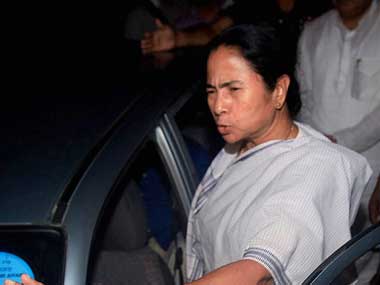Mamata Banerjee fiercely and doggedly opposed digitisation of TV, saying that the move was anti-poor. On the even of the deadline (31 October) for the four metros, Delhi, Mumbai, Kolkata and Chennai to switch off all analogue connections, Banerjee made it clear that this deadline was “unacceptable. We will not allow it”. More details of Mamata-di’s view on digitisation by Firspost’s
Sandip Roy here
.[caption id=“attachment_510650” align=“alignleft” width=“380”]
 West Bengal Chief Minister Mamata Banerjee. PTI[/caption] “Was the state government consulted before this was made mandatory in the four metros? Even if it were to be, was it ensured that there were enough set-top boxes in the market? In a festival month in Kolkata, you suddenly ask people to shell out Rs 1,200-odd to buy set-top boxes. Can everyone afford this at one go? And now you threaten to scrap the licence of MSOs if they fail to comply. Some more time should be given,” the chief minister said, threatening a statewide movement that will “later spread to the whole of India”,
the Times of India reported
. Twenty-four hours after this grandstanding, the same Mamata Banerjee approved of a hike in fares for buses, mini-buses and taxis in Kolkata. “The Mamata Banerjee government has green-lighted increases in transport fares, somersaulting to prevent a total collapse of an essential service and acknowledging under duress the impracticality of a no-hike policy,”
reports The Telegraph
. Taxi fares have moved up by 17-18 percent; bus fares by 15-30 percent and minibus fares by 15 percent. The same Mamata Banerjee who is so concerned with the pain that the ‘people’ will suffer if they are forced to buy set top boxes approves dramatic upward revisions in fares? The minimum taxi fare in Kolkata is now more than the minimum, for example, in Mumbai—a whopping Rs 25. The Telegraph gives you an idea of the impact with some ‘sample’ fares – which see one way increases of Rs 10. The day’s impact for a single member of the family will be Rs 20; for a 20 day working month, that would amount to Rs 500. If there are two members in the family who need to take taxis to get to work, that’s Rs 1,000. Even taking the rise in bus fares—the minimum hike is Re 1—a family of four, making, for example, 40 round trips each (to work, to school, to the market, etc.) per month would see their monthly outgo rise by Rs 320—and that’s taking minimum distances into account. Mamata is fighting for the delay of digitisation of cable—which is more in the nature of entertainment—and agreeing to a hike in public transport—which is more in the nature of an essential. What Mamata seems to be doing is to say to her citizens – let them watch TV and learn to walk.
West Bengal Chief Minister Mamata Banerjee. PTI[/caption] “Was the state government consulted before this was made mandatory in the four metros? Even if it were to be, was it ensured that there were enough set-top boxes in the market? In a festival month in Kolkata, you suddenly ask people to shell out Rs 1,200-odd to buy set-top boxes. Can everyone afford this at one go? And now you threaten to scrap the licence of MSOs if they fail to comply. Some more time should be given,” the chief minister said, threatening a statewide movement that will “later spread to the whole of India”,
the Times of India reported
. Twenty-four hours after this grandstanding, the same Mamata Banerjee approved of a hike in fares for buses, mini-buses and taxis in Kolkata. “The Mamata Banerjee government has green-lighted increases in transport fares, somersaulting to prevent a total collapse of an essential service and acknowledging under duress the impracticality of a no-hike policy,”
reports The Telegraph
. Taxi fares have moved up by 17-18 percent; bus fares by 15-30 percent and minibus fares by 15 percent. The same Mamata Banerjee who is so concerned with the pain that the ‘people’ will suffer if they are forced to buy set top boxes approves dramatic upward revisions in fares? The minimum taxi fare in Kolkata is now more than the minimum, for example, in Mumbai—a whopping Rs 25. The Telegraph gives you an idea of the impact with some ‘sample’ fares – which see one way increases of Rs 10. The day’s impact for a single member of the family will be Rs 20; for a 20 day working month, that would amount to Rs 500. If there are two members in the family who need to take taxis to get to work, that’s Rs 1,000. Even taking the rise in bus fares—the minimum hike is Re 1—a family of four, making, for example, 40 round trips each (to work, to school, to the market, etc.) per month would see their monthly outgo rise by Rs 320—and that’s taking minimum distances into account. Mamata is fighting for the delay of digitisation of cable—which is more in the nature of entertainment—and agreeing to a hike in public transport—which is more in the nature of an essential. What Mamata seems to be doing is to say to her citizens – let them watch TV and learn to walk.
Anant Rangaswami was, until recently, the editor of Campaign India magazine, of which Anant was also the founding editor. Campaign India is now arguably India's most respected publication in the advertising and media space. Anant has over 20 years experience in media and advertising. He began in Madras, for STAR TV, moving on as Regional Manager, South for Sony’s SET and finally as Chief Manager at BCCL’s Times Television and Times FM. He then moved to advertising, rising to the post of Associate Vice President at TBWA India. Anant then made the leap into journalism, taking over as editor of what is now Campaign India's competitive publication, Impact. Anant teaches regularly and is a prolific blogger and author of Watching from the sidelines.
)